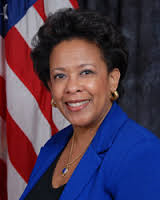
Recent incidents in Charlotte, Tulsa and El Cajon, Calif., were just the latest in a long series of events that have left Americans feeling saddened, angry and confused about the meaning of justice in the United States. These high-profile traumas — which include the tragic officer-involved deaths of civilians and appalling, premeditated attacks on police officers — have laid bare the fault lines of mistrust that too often separate law enforcement and communities of color.
As attorney general of the United States, one of my top priorities has been bridging the divides between police and citizens. I firmly believe that all of us — law enforcement officers, activists and ordinary citizens alike — have a role to play in closing those rifts and repairing the fabric of our society. The Justice Department has been tirelessly pursuing that goal in a number of ways. We dispatch mediators to assist with tense situations, provide local law enforcement agencies with training and technical assistance, and, when necessary, investigate allegations of unconstitutional policing. Our work to restore trust takes many forms, but it is all closely tied to the principles of community policing.
Community policing is a public safety philosophy based on partnership and cooperation. At its core is the idea that everyone has a stake in the safety of the neighborhoods where we live and work, and that none of us, police or citizen, can make them safe on our own. Community policing uses our shared interest as the foundation for deeper understanding, mutual respect and closer partnership. In practice, community policing encourages officers and citizens to communicate regularly, to share concerns and collaborate on solutions, and, above all, to get to know one another as people rather than stereotypes.
And it works. I know, because I’ve seen the results. Shortly after taking office, I began a 12-city Community Policing Tour to learn what municipalities around the country are doing to foster trust and cooperation. I was inspired and encouraged by what I saw. In Cincinnati, I witnessed officers spending time in local classrooms as tutors and mentors in safe and supportive settings for kids. I observed cutting-edge de-escalation training in Phoenix, where officers were taught how to exercise restraint in ambiguous situations. And in Fayetteville, N.C., I learned about the police chief’s youth advisory council, which gives local high school students a meaningful role in shaping their city’s policing practices and policies.
These are just a few examples of the positive work underway across the country. To help other municipalities take steps like these, President Obama has designated this week as National Community Policing Week: a time for law enforcement and communities to come together, acknowledge our shared pain, begin to rebuild trust and chart a peaceful course forward. Over the next several days, the Justice Department and its partners will hold more than 400 community policing events nationwide, where we will focus on ways to ensure that all members of our society can be confident in the guarantee of equal protection under our laws. We also will publish a report about my community policing tour, offering a blueprint for other localities to learn as they work to build trust and legitimacy in their own neighborhoods and implement the pillars of the President’s Task Force on 21st Century Policing.
As attorney general of the United States, one of my top priorities has been bridging the divides between police and citizens. I firmly believe that all of us — law enforcement officers, activists and ordinary citizens alike — have a role to play in closing those rifts and repairing the fabric of our society. The Justice Department has been tirelessly pursuing that goal in a number of ways. We dispatch mediators to assist with tense situations, provide local law enforcement agencies with training and technical assistance, and, when necessary, investigate allegations of unconstitutional policing. Our work to restore trust takes many forms, but it is all closely tied to the principles of community policing.
Community policing is a public-safety philosophy based on partnership and cooperation. At its core is the idea that everyone has a stake in the safety of the neighborhoods where we live and work, and that none of us, police or citizen, can make them safe on our own. Community policing uses our shared interest as the foundation for deeper understanding, mutual respect and closer partnership. In practice, community policing encourages officers and citizens to communicate regularly, to share concerns and collaborate on solutions, and, above all, to get to know one another as people rather than stereotypes.
And it works. I know, because I’ve seen the results. Shortly after taking office, I began a 12-city Community Policing Tour to learn what municipalities around the country are doing to foster trust and cooperation. I was inspired and encouraged by what I saw. In Cincinnati, I witnessed officers spending time in local classrooms as tutors and mentors in safe and supportive settings for kids. I observed cutting-edge de-escalation training in Phoenix, where officers were taught how to exercise restraint in ambiguous situations. And in Fayetteville, N.C., I learned about the police chief’s youth advisory council, which gives local high school students a meaningful role in shaping their city’s policing practices and policies.
These are just a few examples of the positive work underway across the country. To help other municipalities take steps like these, President Obama has designated this week as National Community Policing Week: a time for law enforcement and communities to come together, acknowledge our shared pain, begin to rebuild trust and chart a peaceful course forward. Over the next several days, the Justice Department and its partners will hold more than 400 community policing events nationwide, where we will focus on ways to ensure that all members of our society can be confident in the guarantee of equal protection under our laws. We also will publish a report about my community policing tour, offering a blueprint for other localities to learn as they work to build trust and legitimacy in their own neighborhoods and implement the pillars of the President’s Task Force on 21st Century Policing.
Of course, my commitment — and the commitment of the Obama administration — to community policing extends far beyond this single week. Our country’s founding principles guarantee every person a life of safety, dignity and opportunity. By allowing residents and law enforcement officials to see one another as allies, rather than as adversaries, community policing helps to make that guarantee real — not just for some Americans, but for all.
The writer is the Attorney General of the United States.








